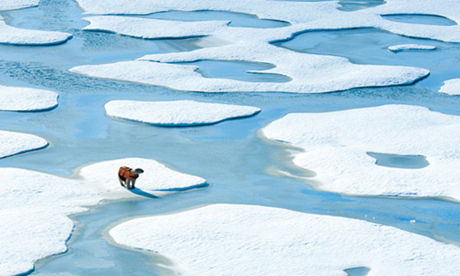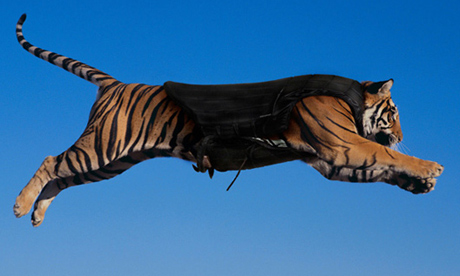Forget planes, trains or automobiles - if Joan Pick wants to go anywhere, she runs. And she eats nothing but raw food. Is her lifestyle extreme or the future we must all face up to? Emine Saner meets her
- The Guardian, Thursday November 13 2008

Joan Pick at her flat in Croydon. Photograph: Frank Baron
We all know we are meant to be reducing our carbon footprint, but I suspect that many people wouldn't be prepared to go as far as Joan Pick. She hasn't driven a car since 1973 and has only been in a petrol-guzzling vehicle twice since then (once in the hearse at her mother's funeral, the other time when an ambulance came to pick her up after she dislocated her shoulder). Her gas supply was cut off sometime when the last Labour government was in power, and her electricity usage is minimal. She eats only raw food and the only items she ever buys are new trainers - because she gets around by running everywhere. Pick is 67 and claims her lifestyle keeps her healthy. "I've been living on nothing for the past 35 years," she says.
She isn't, you gather, an average sort of person. She is charming, in her tracksuit, ready to go out running, with her hair pulled into a baseball cap bearing the symbol of the high-IQ society, Mensa. A scientist for many years, she has a mind that darts off in different directions and it can be hard to keep track of what she is talking about (perhaps because I am not a member of Mensa).
Much as I admire Pick's low impact on this frazzled earth, isn't her lifestyle all a bit, well, extreme? She shrugs her wiry shoulders. "Does it look like a hovel?" she says, throwing a beady glare around her Croydon flat. It doesn't; it is neat and tidy, and the furniture is classic 1960s - very fashionable now - that she has had for four decades. She last owned a television in 1975 and listens to Classic FM and Radio 4 on an old secondhand stereo system. The walls are hung with her own artworks. The only electricity she uses is a single light (low-energy bulbs, of course) for the evenings, and her kettle, which not only makes the tea she drinks all day, but provides the hot water for laundry - which she does by hand - and bucket baths.
Pick doesn't have heating. It is a chilly day so I keep my jacket on, but she is far less weedy than me. Doesn't she get cold? "Sometimes," she says. How does she keep warm? "Clothing and exercise," she replies. Since she gave up cooking, she now uses her heavy cast-iron saucepans as gym weights; space is cleared in her living room for hula-hooping.
She decided to start living like this, she says, "because I realised we have got the energy question totally wrong. I decided to imagine that the earth was a business in need of sound management. We are all members of the board, a shareholder, a trustee, a consumer and an employee. We believed that fossil fuels were infinite, but they are finite."
Pick was a scientist, and writer, for many years, with a particular interest in energy consumption. She despairs that most people have to be forced to change the way they live, rather than making the choices themselves. "They have to almost bribe people to use energy-efficient things. It's terrible. I adopt a [lifestyle] that is consistent with the sustainable management of the world's resources. Everyone knows we have to have very severe cutbacks to meet that standard," she says.
Her world has shrunk to the distance around her flat in south London that she can run to (which isn't small - she can run to Tower Bridge, several miles away). These days, Pick spends her time going to the library to read the papers - "It takes longer on a Thursday because I have to read the New Scientist as well, but it's so awful" - and looking through Who's Who and Google to find the addresses of the politicians, scientists and industry leaders she wants to write to (Pick is a prolific letter-writer, tapping out her missives in dense little letters on an old typewriter).
She rode a bicycle until she felt it had become too dangerous and the last time she went on a plane, she says, was 1971. Doesn't she ever want to go on holiday? "Oh no," she says. "I've never enjoyed going on holidays. You can learn about places by reading about them. My mother died in 1972, and my brother lives in Dallas, so there's no possibility of going there." I wonder if her life isn't a bit isolating. She has never married and doesn't have a partner ("a husband might expect three cooked meals a day. Can you imagine?") and she admits, with a sparkle in her eyes, that her friends and neighbours do think she's "a bit mad". Maybe she is, but perhaps we will all have to live like Pick one day.
She follows a raw vegetarian diet. "I had done studies of the food industry - the beef industry and the destruction of the rainforest to fuel it," she says. "I was at a Mensa dinner, with a vegetarian ..." She doesn't continue this thought. "I've always been a natural fatty ... I had tried every diet in the book, so I decided to try a raw-food vegetarian diet." When was the last time she ate a cooked meal? "I don't know, I can't remember." Doesn't she miss it? A nice bowl of soup, a roast dinner? "Of course not. There's no mess. Have you seen what I eat?" We go into her kitchen, where the cupboards are bare. She opens a large tub full of mixed seeds and nuts, which forms the basis of her diet, along with fruit and wheatgerm. "It's very easy to live like this. I couldn't imagine living any other way now," she says.
It seems a bit joyless to me (where are the treats?), but Pick isn't a joyless person; far from it - she's delightful. I've made her late for her daily two-hour run. We walk down the several flights of stairs together (she never uses the lift) and she runs off into the afternoon sunshine.




